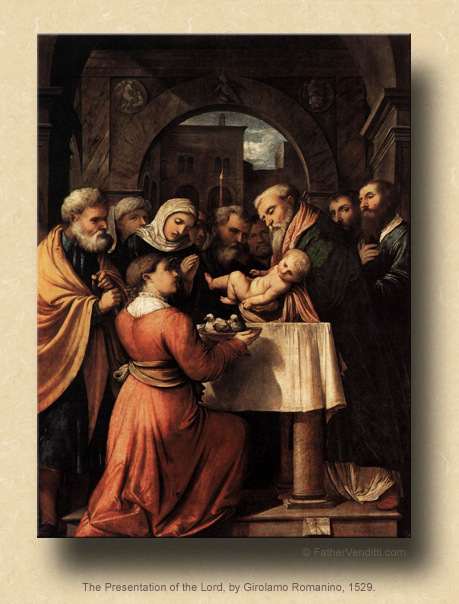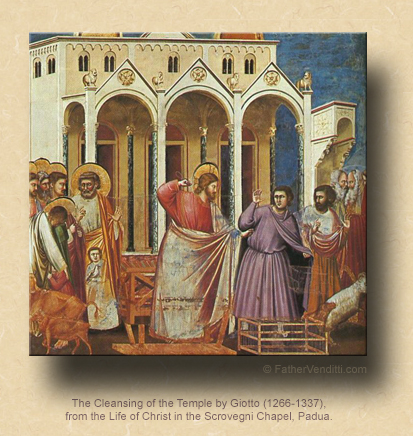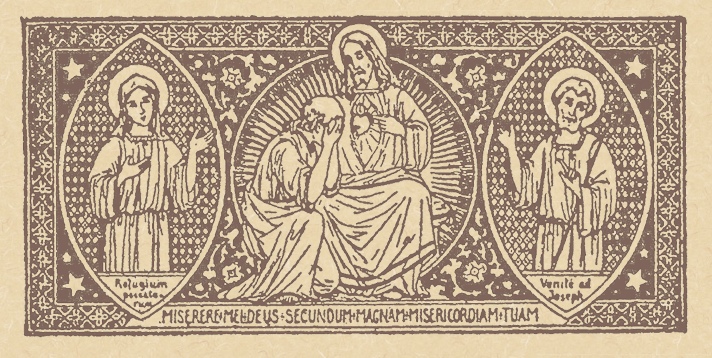There's Nothing Wrong with Taking Up a Collection.
The Third Sunday of Lent.
Lessons from the secondary dominica, according to the ordinary form of the Roman Rite:
• Exodus 20: 1-17.
[or, 20: 1-3, 7-8, 12-17.]
• Psalm 19: 8-11.
• I Corinthians 1: 22-25.
• John 2: 13-25.
Lessons from the feria, according to the extraordinary form of the Roman Rite:
• Ephesians 5: 1-9.
• [Gradual] Psalm 9: 20, 4.
• [Tract] Psalm 122: 1-3.
• Luke 11: 14-28.
FatherVenditti.com
|
 8:01 AM 3/4/2018 — For some peculiar reason, the episode of our Lord throwing the money changers out of the Temple is a very popular image of our Lord, probably because it caters to the very Protestant notion that loves our Blessed Lord but hates the institution of organized religion, founded on the curmudgeonly notion that every large institution exists basically to make money. In this narrow minded perspective, the vendors in the temple area represent to us those who use religion to make a profit, and our Lord driving them out stands for the moral purity of those who love God but hate any kind of religious officialdom. It dovetails nicely with the anti-Catholicism which has always been a part of the American experience, which encourages this idea that true Christianity has nothing to do with the institution of the Church. 8:01 AM 3/4/2018 — For some peculiar reason, the episode of our Lord throwing the money changers out of the Temple is a very popular image of our Lord, probably because it caters to the very Protestant notion that loves our Blessed Lord but hates the institution of organized religion, founded on the curmudgeonly notion that every large institution exists basically to make money. In this narrow minded perspective, the vendors in the temple area represent to us those who use religion to make a profit, and our Lord driving them out stands for the moral purity of those who love God but hate any kind of religious officialdom. It dovetails nicely with the anti-Catholicism which has always been a part of the American experience, which encourages this idea that true Christianity has nothing to do with the institution of the Church.
I like to throw cold water on these popular misconceptions by taking people back to the feast of the Presentation: Mary and Joseph take the Baby Jesus to the Temple because the Law of Moses requires that every first born male be presented to God along with two pigeons or a pair of turtle doves. The whole point of the inclusion of the episode in the Holy Gospel—and the Church's celebration of it—is to show the obedience of the Holy Family, and our Lord, to the requirements of the Law, a lesson that our Lord would reinforce several times in His own preaching throughout his public ministry, particularly when he said, “Do not think that I have come to set aside the law and the prophets; I have not come to set them aside, but to bring them to perfection” (Matt. 5: 17 Knox). It was essential, even to our Lord, Himself, that this law be fulfilled; so, where did Joseph get the two birds for the sacrifice? He bought them from a vendor in the Temple, the same kind of vendor that our Lord drives from the Temple in today's Gospel lesson.
So, the Sunday School interpretation of our Lord's actions, that it's wrong for the Church to make money, simply doesn't pass muster. Of course the Church has to make money, otherwise it couldn't exist in the real world; and, if the Church doesn't exist in the real world, then there are no priests, there is no Mass, there are no sacraments, and Grace is not available to us … unless, of course, you're a Protestant who doesn't believe in the priesthood, the Mass, the sacraments or grace.
Our Lord drives the vendors from the outer court of the Temple not because it's wrong for someone to do that kind of work;—without them, people would not be able to perform their religious duties before God—He drives them out because they're doing it in service to the wrong religion.  When the Jews in today's lesson ask our Lord to justify His actions, He responds to them by predicting his Passion, declaring that He will die and rise three days later; so, He knows—because He is God—that His death and resurrection will result in the creation of a new religion, one that will complete and fulfill the old one. That's why the first lesson of today's Mass from Exodus is the Ten Commandments, the idea being that it isn't enough to know the law, now we're actually going to live it. When the Jews in today's lesson ask our Lord to justify His actions, He responds to them by predicting his Passion, declaring that He will die and rise three days later; so, He knows—because He is God—that His death and resurrection will result in the creation of a new religion, one that will complete and fulfill the old one. That's why the first lesson of today's Mass from Exodus is the Ten Commandments, the idea being that it isn't enough to know the law, now we're actually going to live it.
So, the meaning of our Lord's actions today, and the message of today's Gospel lesson, is not a call to abandon religion in favor of some sort of non-institutional faith that doesn't take up a collection; it's a call to sincerity in our religious practice. We can't buy or bribe our way into heaven, and we all know this; but, sometimes we act as if we think we can: someone who's living an immoral life who tries to make up for it by some kind of philanthropy, or someone living in an invalid union who tries to cancel his sin by engaging in some kind of intense volunteerism. Ted Kennedy, before he died, wrote this impassioned letter to Pope Benedict in which he tried to make the case that his long-standing support for abortion rights was somehow canceled by the fact that he did so much to help the poor, as if helping the poor could possibly make up for millions of dead children. The Holy Father didn't answer the letter; what could he say?
More to the point of our Lord's actions in the Gospel today are those who try to make up for their moral indifference by replacing moral living with devotional practice, and I used to encounter this quite a lot when I was rector of the Blue Army Shrine in New Jersey: someone, for example, who may come to the Shrine and spend an afternoon praying before a statue of our Lord or our Lady, but who's living with a boyfriend or a girlfriend outside of marriage, or married outside the Church; he has misled himself into thinking that buying a bouquet of flowers to place before the Immaculate Heart of Mary cancels the sin of how he's living his life. It doesn't work that way. The only way to cancel the effect of the sin is to confess it, and then stop sinning, or at least make the attempt.
And there you have the true meaning of our Lord driving the money changers from the Temple: it's a symbolic act meant to remind us we cannot use a clever manipulation of our religion to try and assuage our consciences so that we don't have to change our lives. It's coupled with the Ten Commandments from the book of Exodus to remind us that the rules haven't changed, but that we must now begin to live them. Of course, that doesn't happen overnight; it happens as the result of repeated efforts and failures over the years of one's life; and, the point of the season of Lent is to present to us the opportunity to simply make a start.

|

